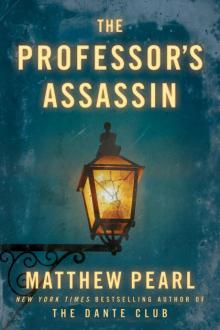- Home
- Matthew Pearl
The Last Bookaneer Page 9
The Last Bookaneer Read online
Page 9
To see the passengers is not so different from what you must see, Mr. Clover, in this restaurant car of the railroad: each person is trying to escape from somewhere or trying to find something they think they have lost. There were about a dozen fellow passengers onboard with us, including an Australian merchant named Lionel Hines. We dined with him at the captain’s table several times. His head and stomach were large in relation to the rest of his body, his eyes like a squirrel’s, his speaking voice loud and intense. The protruding position of his bottom jaw made his teeth seem clenched, and the shape of his mouth seemed made to vent anger. You will see I have cause for the thoroughly harsh opinion of him.
“What exactly is it you are going to do on the islands?”
He asked this question at supper with some of the officers. He was looking at me, so I opened my mouth ready to answer, but Davenport’s voice interrupted before I spoke.
“We travel on business, Mr. Hines.”
Davenport, sitting to my left, had put a period to the exchange in only six words, because he knew that no man of business wanted an obligation to give details of his purpose, and for Hines to press us would violate that unspoken rule. Business was a word that stopped conversation. Hines grumbled slightly, his teeth back to their clench.
This man was particularly displeased with me, though I identified no logical reason for animus. I am believed overly garrulous by many—oh, I know how a peddler is seen by other people. We talk and talk until money changes hands for our wares and then we shut up and move on. But we do not talk in order to sell, contrary to what people believe; we talk because to sell, to convince, to persuade, is a life of loneliness, whether the goods are books, gold watches, or flowers. In any case, Captain Ormond, with his clay pipe always fixed in his mouth, and his officers seemed to enjoy my company, laughing at my anecdotes about some of the colorful characters who would come to my stall in London. I make no personal claims as raconteur. But they were hearing only complaints from the mouth of Hines, and little of anything out of Davenport, who stayed in his tiny berth for four or five hours at a time. There were no female passengers aboard. Many of the other passengers were even more seasick than I was. I was the best option for amusement, in other words, in a place with little competition.
There was a small chamber belowdecks the crew called a library. It had three benches, a broken table, no librarian, no shelves, and no more than twenty inexpensive books kept in an old trunk, half of which were related to sailing or marine matters. Even the semblance of a library was a siren song calling me to it, and as storms overtook the craft and we were forced to spend most of the time between decks it became my usual station. I would put the books out on the table and benches to organize them, even though they would be tossed around again by the waves once they were back in the trunk. This is how Hines found me occupied on an afternoon when the ship was pulled hard by the waves in every direction.
“Rough go of it, isn’t it?” I greeted him. “They say it helps to keep the eyes away from the water.”
He paced back and forth. “Well?”
“Pardon, Mr. Hines?” I had a Walter Scott book in my hand and could not imagine what he was expecting me to say. “Is there something I can help you with, Mr. Hines? I would be happy to help you choose a book.”
“‘Mr. Hines! Mr. Hines!’” he echoed mockingly. “Do you know what it is that so irks a man like me about a bookworm like you?”
I felt the blood drain from my face and said I did not.
“You look like you’re reading even when there is no book in your hands. A shadow falls in circles around your eyes even when you do not wear your dapper little eyeglasses. Savvy?”
“Spectacles. If my eyesight were a bit better, perhaps eyeglasses would suffice. But I confess I do not understand—”
“You read instead of going to church; you forsake God.”
“I did find church rather repetitive in my childhood, for it was like reading the same book again and again, and back then I was reading one or two books every day. But see here! I have never forsaken God, and have lived by righteous principles.”
“You think you’re better than the rest of us. Better than a man like me without a formal education. Is that what you think about while you hide yourself behind your precious books?”
He was leaning into me and shouting as he revealed his anger, and my answers did nothing to assuage him. I could smell liquor on his clothes and breath, an indication of how he was coping with the increased time belowdecks. I stretched my arm out toward the nearest bell to call for a steward, but it was just past my reach. His hand came toward my face and I prepared to be struck. Instead he snatched off my spectacles.
Here you go, Mr. Clover, take a look at the world through my spectacles. Everything blurs, doesn’t it? Thank you—now, don’t drop them! Mr. Clover, you see how much hard work they do for me, and what happens when I am deprived of their help. Everything blurred together. I stumbled to my feet and backed away to try to see better. I could make out enough to determine that Hines had put my spectacles over his own face, stretching the metal roughly to fit over his ears. He was using a nasal pitch to imitate my voice. I could hear another man enter the chamber from behind me and I burned with greater shame at having a witness. When I became a bookseller, I sometimes think it was to ensure, however little money I earned, I would not have to encounter men like Hines.
The second man was an utter kaleidoscope of warm colors from where I stood.
“This is between me and your book-obsessed friend. You stay clear,” warned Hines.
“Fergins. Mr. Hines,” he finally greeted us. It was Davenport. When he fell quiet I could hear his calm breathing as he was assessing the scene.
Hines threw my spectacles back at me as though to remove evidence of taking them. I put them on and blinked a few times to gain my bearings.
“Just a little conversation between men, I say,” Hines went on. “No, I stand corrected. Not between men. Between man and bookworm. Savvy?”
“You do not like that my friend is in the book trade.”
“It’s nothing to me what he is,” groused the merchant, slipping into a more civilized tone. “I simply do not appreciate being condescended to by men who think they are better than me because they carry the leathery odor of books on their skin.”
“I tend to agree with you,” Davenport said, situating himself on one of the benches with a lit cigar and handing a cigar to the Australian.
“Do you?”
“A man must never think reading a book makes him special. Speaking of that, what book is it that inside your coat?”
Hines played dumb but Davenport never could countenance liars, or dumb liars, and went on without mercy: “There is a certain way a man carries himself with a book on one side, and the outline through the material of an inexpensive coat is a distinctive one. I noticed when you first came down the stairs into the captain’s room our first evening. Yours is a thin volume, and a small edition, no doubt, perhaps poetry. I’ve found the man who carries a book in his coat pocket relies upon it with passion and a dependence as a captain of a ship does upon a compass on a moonless night. A book that changed your life.”
“What nonsense you speak!”
“Show me,” ordered Davenport.
We both waited. The motion of the ship rocked us left and then right. There was nothing more the man could say. The wrath on his face drifted into submission. Hines reached into his coat and slowly pulled out a slender book, just as Davenport described. The bookaneer passed it to me.
“Leaves of Grass, by Walt Whitman,” I said, rotating it in my hands. “The pages have been cut with a careful touch. The leaves have been turned many times but none torn. This book has been wonderfully treasured.”
Hines stood with his head hung low. “I should thank you for my property back.”
Davenport put down his ciga
r and took the book from me. He leaned his face close to the merchant’s. “Books inspire a man to embrace the world or flee it. They start wars and end them. They make the men and women who write and publish them vast fortunes, and nearly as quickly can drive them into madness and despair. Stay away from what you do not fathom from now on, and we will like each other better.”
He reached into Hines’s coat and slipped the book inside. Hines did not look at either of us. He walked over to the table and drew his arm across it with a grunt, sending books flying to the floor, before exiting.
I began to try to thank Davenport but he spoke over me.
“Excellent,” he said to himself. “An excellent development.” His voice was almost pleased (giddy, really, for Davenport).
I was confused. “How did you even know I needed help down here?”
“Help?” He seemed to be considering my meaning. “I was listening to the pleasing sounds of the storm from the passageway, imagining what horrible screams one would hear if a ship scuttled, when I saw Hines with a marching step and a rather pitiful look of rage on his face on the move in this direction. Knowing you have been spending time in here as a sort of sailing librarian, and having taken note of his amusing dislike for you, I presumed there was the possibility of a confrontation.”
“You were precisely right. Well, I do appreciate your help,” I reiterated, a little less sure.
He still seemed perplexed by my sentiment. “Did you not see it, Fergins?”
“See what?”
“When I remarked that books could start wars, his eyes fell like a rock, however unconsciously, on this.”
He pointed to a copy of Robert Louis Stevenson’s Treasure Island, a standard in the library of any ship where there were young men among the sailors. In fact, a book that had made more than its share of sailors.
“Treasure Island?” I asked.
“Not the book, but the name of the author drew his unconscious thoughts,” Davenport noted with an air of satisfaction. “I have suspected that Hines, as a merchant with dealings in Samoa for some years, would have some knowledge of what Stevenson is involved in there. Of course, I do not want to draw attention to our interest by asking direct questions. But now he has begun to reveal his impression of Stevenson’s role on the island, and to add knowledge that I believe will make my mission successful.”
“You came into the library to see if the man would reveal something about Stevenson?”
“Indeed. And very much worth the effort.”
He gave a proud nod, rising to his feet. As I sat frozen with astonishment, he started to walk toward the door but stopped when his eyes landed on a book, one of the volumes knocked down by Hines and now sliding across the slanting floor. His bottom lip quivered slightly and he closed his eyes before he stepped around the book and continued out.
V
I suspect you have never heard of a French novel called The Castle in the Forest. How a copy of it came to lead a life at sea in the frigate’s library, I will not venture to guess any more than I would the provenance of the rest of the trunk’s hodgepodge. There was a time long ago when the author of that title, Elizabeth Barnard, was very popular, particularly in France, where she lived, and an era when each of her books would have been translated into English and many other languages. Now her name, like those of her novels, is all but forgotten, not only by a young man your age, my dear Mr. Clover, but by most people. There is no great mystery to what happened to Mrs. Barnard, for it happens to so many authors. People imagine that literature is the collection of books that we read as a nation or society, but, for just a moment, picture it as something alive instead, a new organism. Not a pretty or delicate thing, either. A grotesque, cold-blooded beast, as big as the biggest whale and growing. Give it seven or eight heads while we’re at it, and it feeds on a book in each loathsome mouth simultaneously. Each book requires whatever blood and tears an author has, but to the beast of literature it is merely one sliver of a meal to swallow down, and upon ingesting it that particular head of this beast licks all its shiny red lips, as if to call out, “Next!” If the same author provides another meal quickly enough, then the beast has been pleased; if not, the beast swallows the unlucky author whole instead and waits in rage for the next one. The hydra-headed abomination savors female authors in particular—Mrs. Shelley and Harriet Beecher Stowe could never satisfy its appetites after their respective masterpieces had been consumed. The moral is this: authors do not create literature; they are consumed by it. As a bookseller, I am often asked if I didn’t dream of being an author, but I should rather think it is the author who learns to dream of becoming a bookseller. I do not seek the mantle of genius. I am an appreciator, an observer, a preposition, and content in that, and that is me in a nutshell.
Back to Pen Davenport’s ambivalent emotion upon laying eyes—for what was probably the first time in years—upon that book sliding across the library floor of the man-of-war. I believe his reaction relates directly to an early time in his career as a bookaneer, and it is worth a brief digression to shed some light on it. Mrs. Barnard moved from her native England to the beautiful rural environs of France after marrying a French potter. She had already published a few forgettable pieces of magazine poetry in England under her industrious maiden name, Werker. While in their tiny village in France and while her husband shaped clay, she spent her hours writing prose alone in their quiet cabin. There were heroines, and magic, and sorcery, and devious monsters disguised as suitors. These may sound like trifles to a young man who prefers Socrates over Horatio Alger. But there is a truism that if women who live in the countryside enjoy a book, then that book could sell anywhere, and Barnard soon was writing novel after novel, with her novels keeping the presses in Paris humming around the clock. Success plagued her with overly enthusiastic admirers as well as ruthless critics punishing her for popularity. After five books, she proclaimed that she would never put pen to paper again. As quietly as they had come, she and her husband moved away, some said to Ireland and others to Bath, for a life of peace. A few years later, news of her death reached the Continent.
It was about a month after the newspapers reported her death that a young man in rustic clothes was walking into the offices of Mrs. Barnard’s publisher in Paris. He explained that he was hired to remove some crates left abandoned in a shed on the property formerly belonging to the potter and his novelist wife, and was given permission to keep what he liked. He came upon a bundle of papers and, preparing to burn it, noticed the page on top. A Tomb—so it said—a romance by Elizabeth Louise Barnard. The publisher on the other side of the desk from this visitor had many years of experience and a deep suspicion of forgeries. He never knew Mrs. Barnard personally, as she had been reclusive even before her abrupt departure, but he knew her work intimately. To his utter joy, after examining the mysterious pages, he had no doubt they were authentic. Since the family of the deceased had given this young laborer permission to keep whatever he wished, he owned the manuscript. The lad had lucked into a golden goose.
To the publisher’s amazement, the visitor refused to sell. “No. If she wanted to have it published, wouldn’t she have done it herself?” young Pen Davenport moralized in French.
Davenport made himself scarce but left enough traces to be found and sent for. He knew the publisher’s head would burst thinking of the money he could make from a posthumous Elizabeth Barnard book.
The publisher soon arranged to have him return to Paris. “Good day,” the publisher greeted him, with a big smile this time.
“I must tell you, sir, that I haven’t changed my mind. Indeed, I have not even brought the manuscript I suppose you’re still after.”
The man recovered after a moment of disappointment and took the young laborer on a tour of the offices. He brought him to a vault. There was not money inside but stereotype plates and woodcuts from which their books were made. He meant to persuade the naive lad by de
monstrating the importance of the trade of publishing, one can suppose, by placing the objects in his hands. The young and morally upright man did not waver. However, after a long day being regaled by the publisher at Paris’s finest coffee shops and wine taverns, the visitor finally relented, agreeing to a small fortune in exchange for retrieving and handing over the manuscript. The publisher happily parted with the sum. He could barely contain himself. After all, whatever he was paying this simple country boy was far less than he would have had to pay Mrs. Barnard herself, who had been a very hardheaded woman.
A few weeks after purchasing the manuscript from the laborer, he received a letter from England. It purported to be written by Mrs. Barnard, assuring him that she was very much alive, that the rumors of her death in the papers were so foolish she had not even responded to them, and that she had heard about his plans to publish a new book by her while she was visiting London. She had written no book called A Tomb, she protested, and in fact everything she had ever written had been published and she did not seek to enlarge the list.
The publisher trembled at the thought of losing the money he had given to the laborer and the far greater sums spent preparing the publication. Childishly, he hid the letter and then incinerated it in the boiler. He did his best to forget it. Until one day a woman appeared in their offices. She was short with thick black curly hair and a glowing white complexion, smelling of oranges and mint, with a small mouth.
“Good afternoon. I am Elizabeth Barnard, and I understand you are publishing a book under my name that I did not write.”
The publisher was speechless, no doubt burning up at the thought of the lad who had somehow tricked him. Him, of all people.
“Mrs. Barnard. Thank goodness you are among the living!”
She waited, her expressive brow wrinkling.
“We must have been duped,” he went on.
“By whom?”

 The Dante Club
The Dante Club Dante Club
Dante Club The Poe Shadow
The Poe Shadow The Dante Chamber
The Dante Chamber Ginnifer
Ginnifer Company Eight
Company Eight The Technologists
The Technologists The Professor's Assassin
The Professor's Assassin The Last Bookaneer
The Last Bookaneer Company Eight (Kindle Single)
Company Eight (Kindle Single) The Technologists: A Novel
The Technologists: A Novel The Last Dickens
The Last Dickens